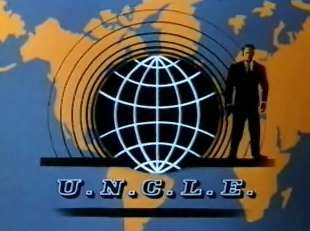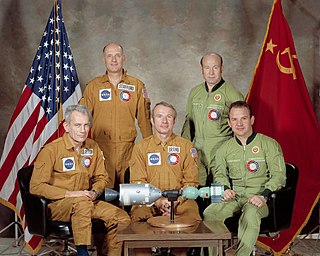Related Research Articles

Apollo 13 was the seventh crewed mission in the Apollo space program and would have been the third Moon landing. The craft was launched from Kennedy Space Center on April 11, 1970, but the landing was aborted after an oxygen tank in the service module (SM) exploded two days into the mission, disabling its electrical and life-support system. The crew, supported by backup systems on the lunar module (LM), instead looped around the Moon in a circumlunar trajectory and returned safely to Earth on April 17. The mission was commanded by Jim Lovell, with Jack Swigert as command module (CM) pilot and Fred Haise as lunar module (LM) pilot. Swigert was a late replacement for Ken Mattingly, who was grounded after exposure to rubella.

Skylab was the United States' first space station, launched by NASA, occupied for about 24 weeks between May 1973 and February 1974. It was operated by three trios of astronaut crews: Skylab 2, Skylab 3, and Skylab 4. Operations included an orbital workshop, a solar observatory, Earth observation and hundreds of experiments. Skylab's orbit eventually decayed and it disintegrated in the atmosphere on July 11, 1979, scattering debris across the Indian Ocean and Western Australia.

The Man from U.N.C.L.E. is an American spy fiction television series produced by Metro-Goldwyn-Mayer Television and first broadcast on NBC. The series follows secret agents Napoleon Solo, played by Robert Vaughn, and Illya Kuryakin, played by David McCallum, who work for a secret international counterespionage and law-enforcement agency called U.N.C.L.E.. The series premiered on September 22, 1964, and completed its run on January 15, 1968. The program was part of the spy-fiction craze on television, and by 1966 there were nearly a dozen imitators. Several episodes were successfully released to theaters as B movies or double features. There was also a spin-off series, The Girl from U.N.C.L.E., a series of novels and comic books, and merchandising.

Apollo 13 is a 1995 American docudrama film directed by Ron Howard and starring Tom Hanks, Kevin Bacon, Bill Paxton, Gary Sinise, Ed Harris and Kathleen Quinlan. The screenplay by William Broyles Jr. and Al Reinert dramatizes the aborted 1970 Apollo 13 lunar mission and is an adaptation of the 1994 book Lost Moon: The Perilous Voyage of Apollo 13, by astronaut Jim Lovell and Jeffrey Kluger.

Gordon Angus Deayton is an English actor, writer, musician, comedian and broadcaster.

Apollo–Soyuz was the first crewed international space mission, carried out jointly by the United States and the Soviet Union in July 1975. Millions of people around the world watched on television as an American Apollo spacecraft docked with a Soviet Soyuz capsule. The project, and its handshake in space, was a symbol of détente between the two superpowers amid the Cold War.

The Douglas C-54 Skymaster is a four-engined transport aircraft used by the United States Army Air Forces in World War II and the Korean War. Like the Douglas C-47 Skytrain derived from the DC-3, the C-54 Skymaster was derived from a civilian airliner, the Douglas DC-4. Besides transport of cargo, the C-54 also carried presidents, prime ministers, and military staff. Dozens of variants of the C-54 were employed in a wide variety of non-combat roles such as air-sea rescue, scientific and military research, and missile tracking and recovery. During the Berlin Airlift it hauled coal and food supplies to West Berlin. After the Korean War it continued to be used for military and civilian uses by more than 30 countries. It was one of the first aircraft to carry the President of the United States, the first being President Franklin D. Roosevelt during World War II.

Cosmosphere is an international science education center and space museum in Hutchinson, Kansas, United States. It was previously known as the Kansas Cosmosphere. The museum houses over 13,000 spaceflight artifacts—the largest combined collection of US and Russian spaceflight artifacts in the world, and is home to various space educational programs.

Spy Hunter is a vehicular combat game developed by Bally Midway and released for arcades in 1983. The game draws inspiration from the James Bond films and was originally supposed to carry the James Bond brand. The object of the game is to drive down roads in the technologically advanced "Interceptor" car and destroy various enemy vehicles with a variety of onboard weapons. Spy Hunter was produced in both sit-down and standard upright versions with the latter being more common. The game's controls consist of a steering wheel in the form of a futuristic aircraft-style yoke with several special-purpose buttons, a two-position stick shift, and a pedal used for acceleration.

Project Gemini was the second United States human spaceflight program to fly. Conducted after the first American crewed space program, Project Mercury, while the Apollo program was still in early development, Gemini was conceived in 1961 and concluded in 1966. The Gemini spacecraft carried a two-astronaut crew. Ten Gemini crews and 16 individual astronauts flew low Earth orbit (LEO) missions during 1965 and 1966.
"Minefield" is the twenty-ninth episode of the science fiction television series Star Trek: Enterprise, the third episode of the second season. In this episode, which aired in October 2002, the spaceship the Enterprise is rocked by an explosion, and the crew tries to deal with the situation.

Gregory Joseph Sierra was an American actor known for his roles as Detective Sergeant Chano Amengual on Barney Miller, Julio Fuentes, the Puerto Rican neighbor of Fred G. Sanford on Sanford and Son, and as Marruja in The Castaway Cowboy (1974).
Hunter Ellis is an American military veteran and television personality.

Newsfront is a 1978 Australian drama film directed by Phillip Noyce, and starring Bill Hunter, Wendy Hughes, Chris Haywood and Bryan Brown. The screenplay is written by David Elfick, Bob Ellis, Philippe Mora, and Noyce. The original music score is composed by William Motzing. Shot on location in Sydney, Australia, the film is shot in black and white, and colour, incorporating actual newsreel footage.

Ronald Radd was a British television actor. He originated the role of Hunter in the television thriller series Callan. In 1971, he was nominated for a Tony Award for Abelard and Heloise.

Terminator Salvation is a third-person shooter action video game, released on May 19, 2009 to coincide with the release of the film of the same title on the same week. It was developed by The Halcyon Company's gaming subsidiary, Halcyon Games, along with Grin and published by Equity Games and Evolved Games. The game was Grin's last game and was released for Microsoft Windows, PlayStation 3, Xbox 360, mobile, and iOS.

CURV-III was the fourth generation of the United States Navy Cable-controlled Undersea Recovery Vehicle (CURV). CURV was a prototype for remotely operated underwater vehicles and a pioneer for teleoperation. It became famous in 1966 when CURV-I was used to recover a hydrogen bomb from the floor of the Mediterranean Sea. In 1973, CURV-III performed the deepest underwater rescue in history when it rescued two men 1,575 feet (480 m) from the ocean surface who were stranded 76 hours in the submersible Pisces III with just minutes of air remaining. The CURV-III became known in the Great Lakes region in 1976 when it was used to survey the wreck of the SS Edmund Fitzgerald. CURV-21 is the current generation that replaced CURV-III.
"The plane crash" is a storyline from the Australian television soap opera Neighbours that began on 24 October 2005 when an aeroplane, carrying several characters, crashed in Bass Strait after a bomb was detonated during the journey. The storyline aired as part of the show's 20th anniversary and would be the catalyst for several major storylines that aired the following year. "The plane crash" also saw the departures of three established characters: David, Liljana and Serena Bishop. The actors' departures had been announced in May 2005, but it was not confirmed they would depart during "The plane crash" until their last scenes aired.
"Exile" is the thirty-second episode of the twenty-ninth series of the British medical drama Casualty. It was written by Kelly Jones, directed by Steve Hughes, and produced by Jonathan Phillips. "Exile" first aired on 16 May 2015 on BBC One in the United Kingdom. The plot sees Charlie Fairhead and Connie Beauchamp travel to Bucharest to help Charlie's son Louis, who has become a heroin addict and is planning on selling his kidney to pay his debts.
"Bouncing Back" is the eleventh episode of the third season of the American television series Agents of S.H.I.E.L.D. Based on the Marvel Comics organization S.H.I.E.L.D., it follows Phil Coulson and his team of S.H.I.E.L.D. agents as they investigate the appearance of a new Inhuman. It is set in the Marvel Cinematic Universe (MCU) and acknowledges the franchise's films. The episode was written by Monica Owusu-Breen, and directed by Ron Underwood.
References
- 1 2 McNabb, Matt (2006-05-18). "History Hunter - Episode of 'Man, Moment, Machine' on Apollo 13 filmed at Cosmosphere". The Hutchinson News . Archived from the original on 2024-08-22. Retrieved 2024-08-22.
- ↑ Hoffman, Stephanie (2005-07-01). "Rescue re-enacted by movie crew". Half Moon Bay Review . Archived from the original on 2024-08-22. Retrieved 2024-08-22.
- ↑ Raskin-Zrihen, Rachel (2006-09-20). "Film crews back on M.I. for History Channel series". Vallejo Times Herald . Archived from the original on 2024-08-22. Retrieved 2024-08-22.
- ↑ Filucci, Sierra (2022-02-28). "Parents' Guide to Man, Moment, Machine". Common Sense Media . Archived from the original on 2024-08-22. Retrieved 2024-08-22.
- ↑ Batey, Angus (2006-04-13). "Choice - Multichannel". The Times . Archived from the original on 2024-08-22. Retrieved 2024-08-22.